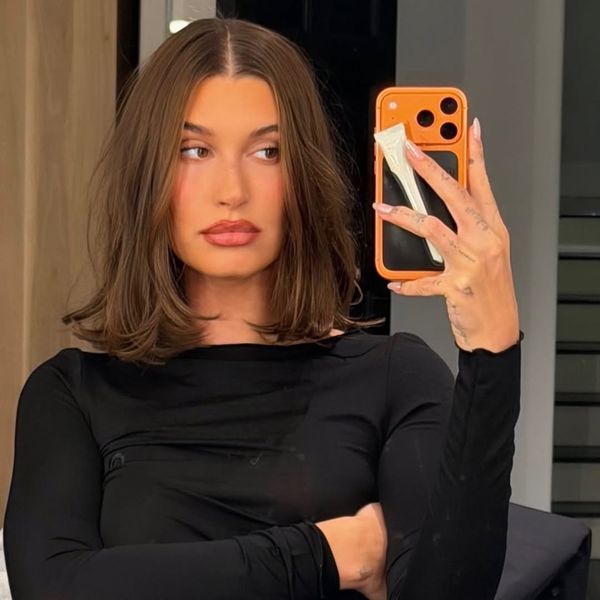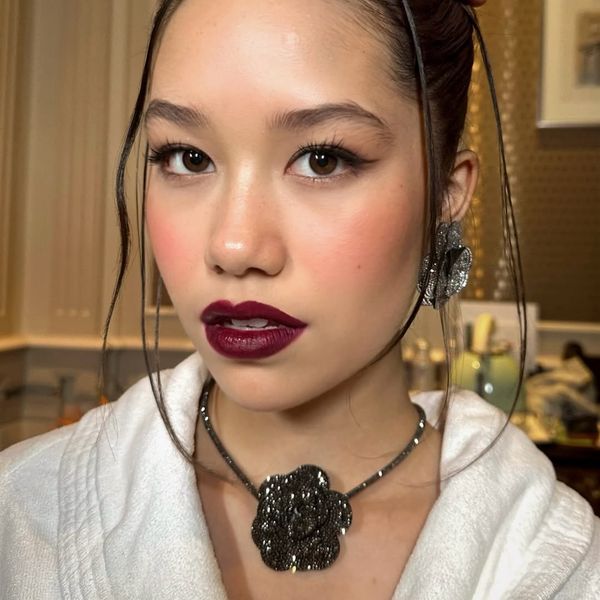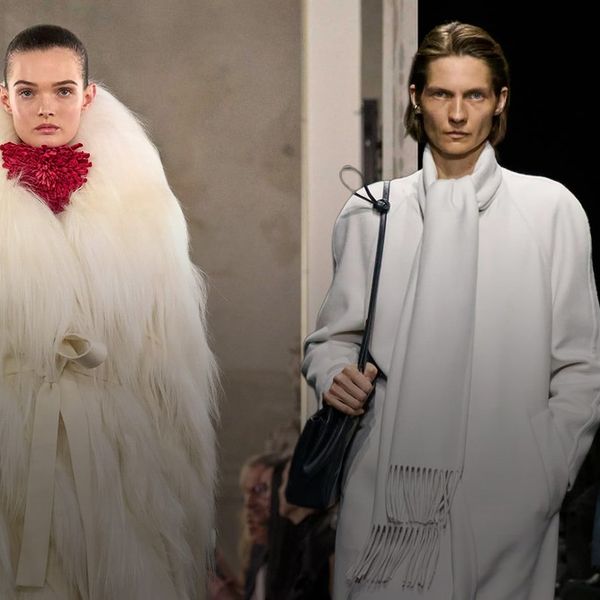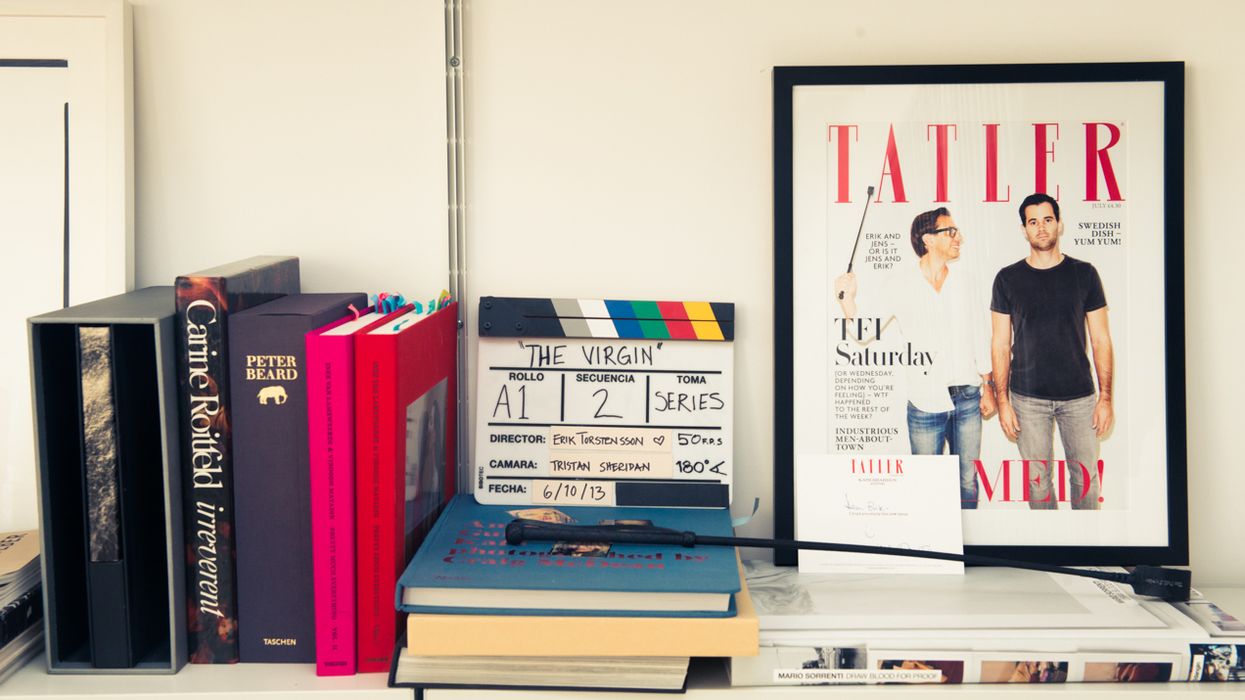
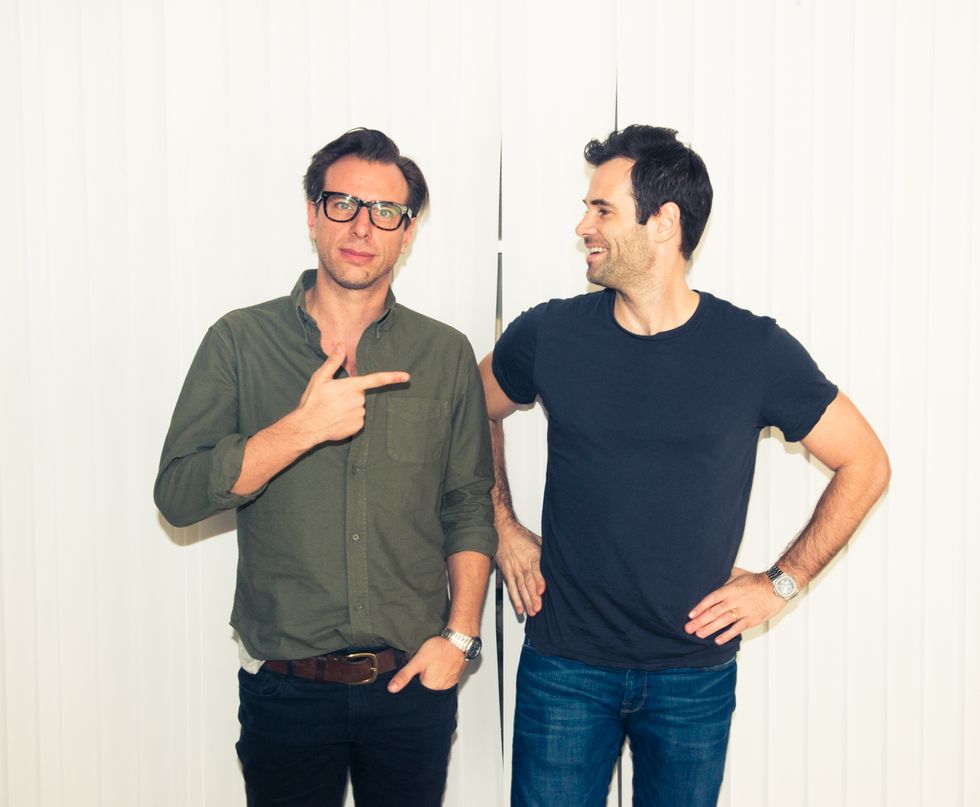
There are days where we think ordering a coffee and an Uber at the same time or having to balance after work drinks with looming deadlines, is multi-tasking. But then, after our most recent shoot at their London HQ, we remember that Jens Grede and Erik Torstensson, co-founders of Saturday Group, oversee a whopping 12 separate companies. Ones ranging from art direction to talent and brand management to sales and digital, with two (!) fashion lines and a biannual industry-centric love letter of a magazine to boot. And if these two still find time to both pal around with Karlie Kloss and conceive mammoth concepts like Mr. Porter in their downtime, you can probably fit in the occasional call to your mom, okay?
We digress, but the sentiment remains the same. When they're not handling enormous campaigns for H&M, conceptualizing digital identities for Balenciaga and Calvn Klein, or convincing Natalie Portman to sign off as the face of Dior, they're working on their womenswear line, Grace, or denim line, Frame, OR putting together the latest issue of Industrie (as EIC, our pal Yale Breslin might have a little bit to do with that, too). And yes, there's an emphasis on the 'they' for a reason—while Torstensson functions as CCO and Grede as CEO, they very much so function as one unit (they're the types that finish each other's sentences). Chalk it up to a Swedish thing.
Erik: "We didn’t like each other at the beginning!"
Jens: "I was fairly young and arrogant at the time. Erik was probably thinking, 'who is this dude, coming in here acting like Charlie big bananas?'
We started working together, and fast became great friends. We shared so many interests and ideas, it really did not take very long until we made a strong connection. After six months we were sharing an apartment and we have been inseparable ever since. We are each in happy relationships [Jens is married to Emma Findlay; Erik is with Natalie Massenet]. Our relationship with each other could also be described as a marriage."
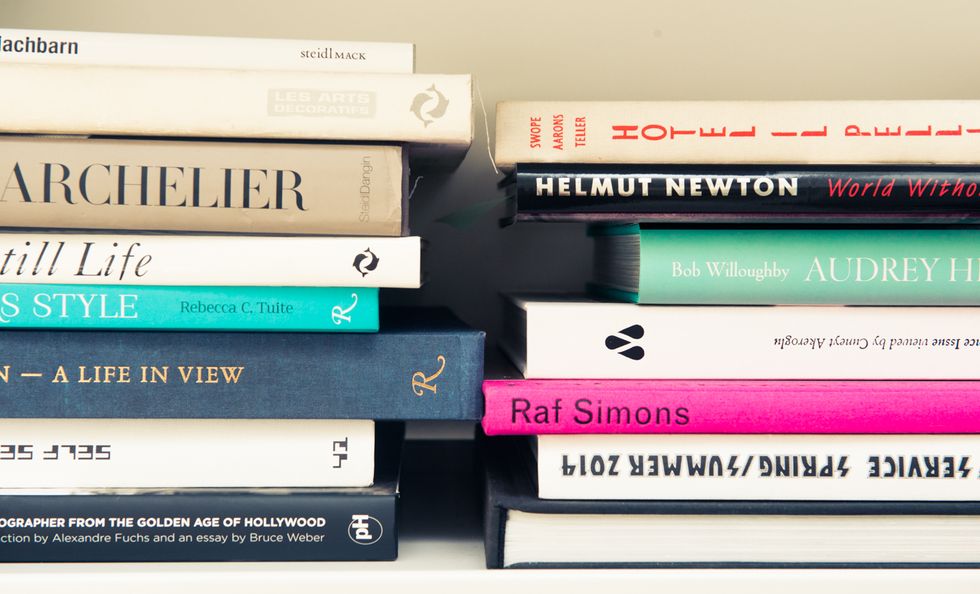
"To treat the world like one place. We work with clients from Asia to the U.S., and we always have done. Tyler had this attitude that the world is around the corner, only a flight away. I think we brought that sense with us. It is also easy to forget how young he was—Tyler must have been 31 when we first started working with him. He was doing this for the first time. The team, we were all doing it for the first time. It was a great education for us both, through trial and error."
"We were 24 at the time, when we started Saturday London, which later became, and is now Wednesday Agency after the merger of our two agency brands. There was no real masterplan. We wanted to work together, that was the driving force. Sometimes you are so naïve that you try it, and you become successful. If we would have known how hard it is to start a business and how few succeed at it, then we're sure we would never have done it at the time. It ended up being the best thing we could ever do. Being naïve was a real strength."
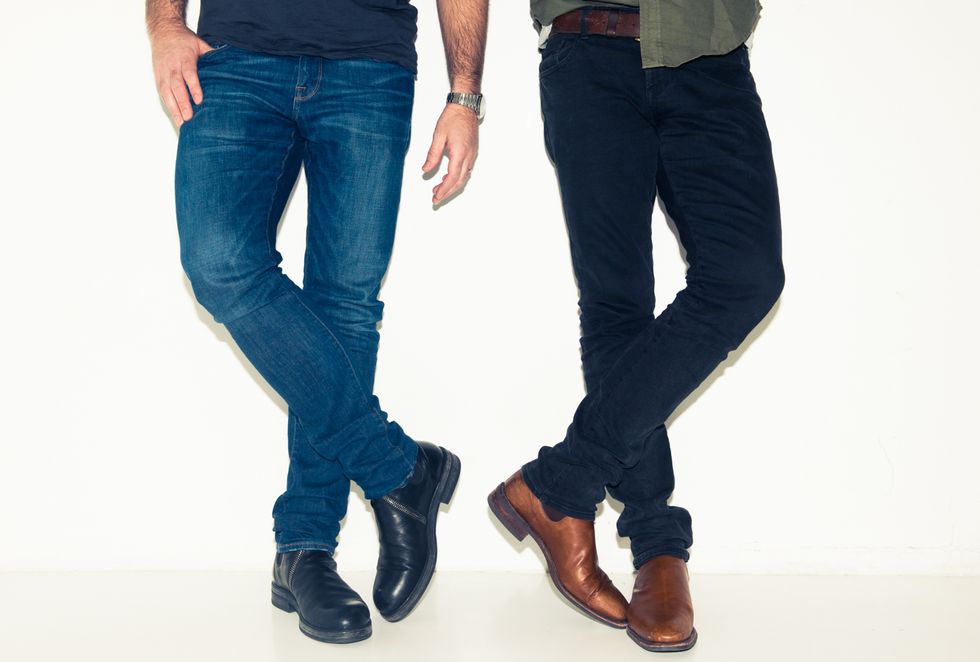
"When you start out, you get two types of clients—the ones who does not want to pay very much and the ones that want to be in full control. We had our fair share of both, of course! We were very lucky that Neil Clifford and Rebecca Farrar Hockley of Kurt Geiger took a chance on us and with whom we work to this day, as well as Marina Piano and Marco at Bally. They were our first two clients. The struggle is not to get a client, but get to do great work. No one will easily trust 20-somethings with millions of dollars, so you really have to earn every inch. Getting the opportunity to work with great people and the freedom to do great work is very hard and takes a long time, we are still working towards that today."
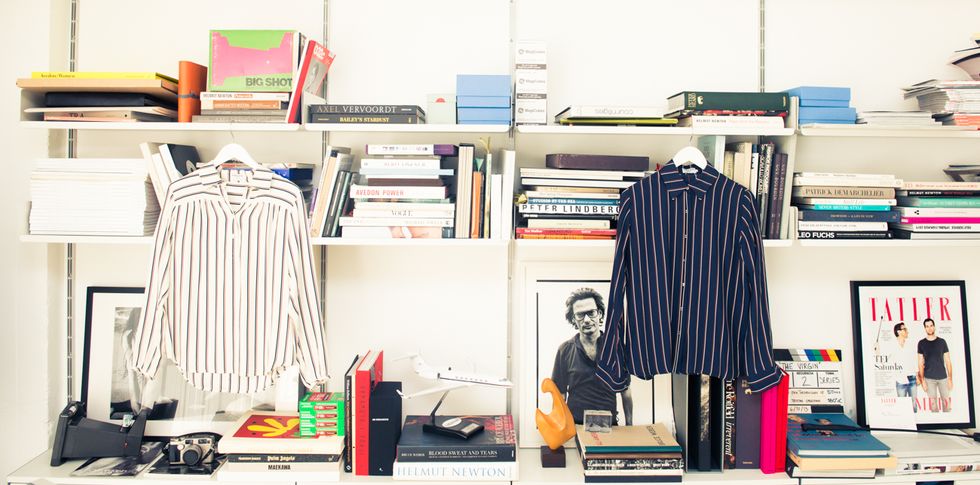
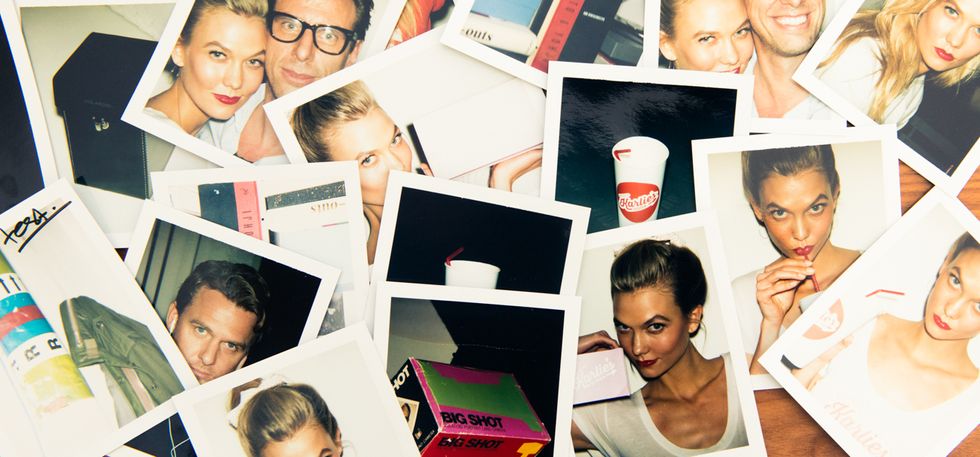
"If we talk about Wednesday, the success is the work itself, such as the creation of Mr. Porter and many of the bigger campaigns, such as Justin Bieber for Calvin Klein. The success is also having established a culture in Wednesday’s offices in London and NYC, and seeing our colleagues develop and rise to the challenge. On a personal level, we are of course also proud of having started FRAME, which has been an incredible journey. The brand is now available in over a thousand stores. We are also proud to have invested in, and supported, a number of entrepreneurs and to have had a small part in the success of what they have created.
There are too many challenges to mention. Our day is a succession of problems. Sometimes it is hard to see the progress, because you are fighting fires. At the end of the day, you just have to keep on doing something the best you can and little by little you move that needle forward. That’s our philosophy."
Jens: "I wear a thin gauge navy cashmere sweater over a thin t-shirt and navy or grey FRAME jeans. I wear sneakers most days, mainly Nikes. If I’m at a meeting or an event, I wear boots."
Erik: "Similar, jeans, FRAME of course, usually a shirt, and boots, usually by Saint Laurent."
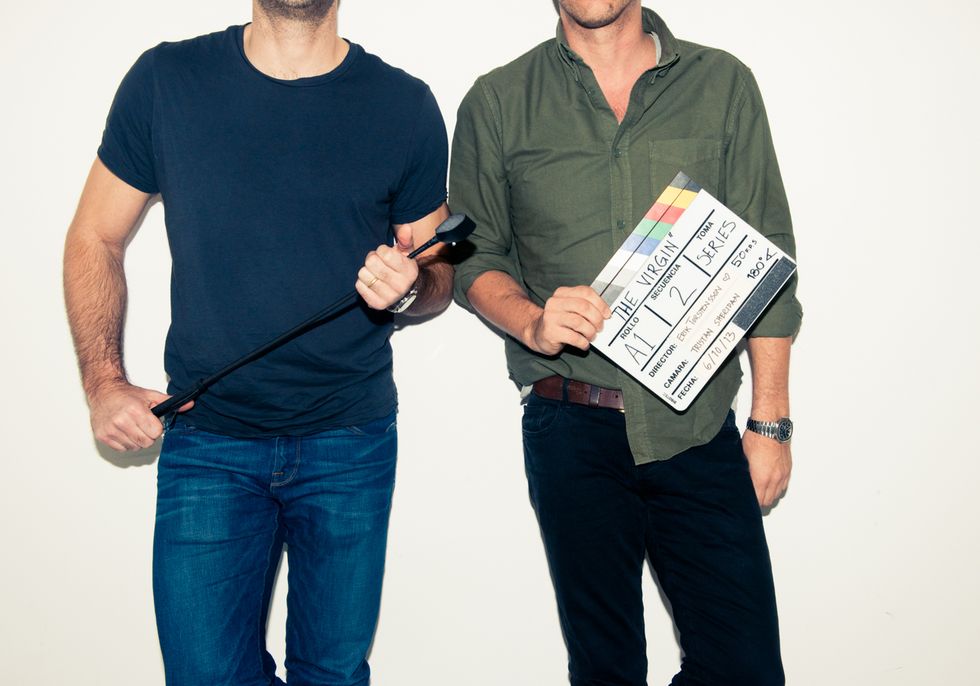
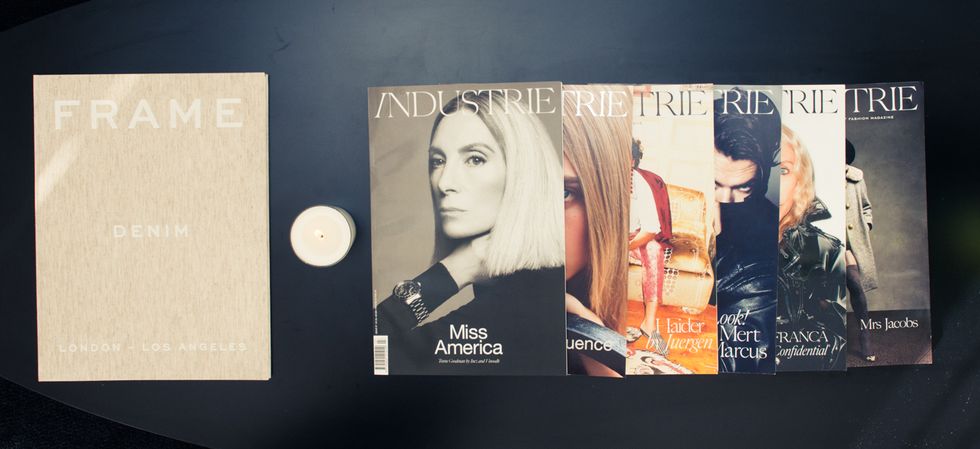
"It is impossible to find a partner, it’s something which kind of happens to you. A happy accident, as it were. A defining factor is having worked together before we were best friends. We are therefore able to have a work relationship and a friend relationship separate and at the same time. If we would argue about something at work, we could still go for lunch the next minute and have a laugh. We know each others boundaries."
Jens: "Erik is much more the creative director, who thinks of ideas and solutions, no doubt about that. He has a remarkable taste level."
Erik: "...And Jens is far more the entrepreneur of the two of us. I always say that I am an entrepreneurial creative, and he is a creative entrepreneur. I think that sums it up pretty well. We have input on each other's work, but know where the lines are."
Jens: "I don’t think much is worth fighting over. Erik is the same. If one of us really does not like something, well, then it does not happen."
"When we are in London, we get into to work around 9, and most of the day is spent in internal and some external meetings, working on ideas and strategy. We rarely leave our office, other than at lunch."
Jens: "The lunch hour is a holy time for a Swedish person! We most often have lunch with each other, it is an excellent time to digest what is happening and make decisions. If Erik or I are out of town, then we have lunch with a colleague or partner. When travelling it is a whirlwind!"
Erik: "I attend a lot of productions around the world, and when I am on a shoot, I have to be 100% focused on the task at hand."
Jens: "I travel a lot to our offices to see our partners, and to meet new people and discover new ideas and opportunities. Since we both have families, we try to pack as much in, in every trip, as humanly possible. Our schedule can get pretty nuts."
"Art, movies and history, as well as what our contemporaries do."
Jens: "I love Instagram. We both do. The danger however is that you curate your own world, and gradually start believing that what happens in your stream is what is happening in the world. You can really miss out, being too narrow in your media consumption. You lose the sense of what is really important, so I keep an open mind and consume vast amounts of information daily. Most great things are discovered by friends, and sent to me. Sharing information is the greatest form of media consumption there is."
"When we were still young, and it was still Saturday London, and we started to do reasonably well, we did not have families, nor did we have many material aspirations. We invested what the company could spare (t was not that much), in other businesses or people that excited us. It was not very conscious either, it was driven by a love for fashion and communication. We felt we wanted to be part of it as broadly as we could."
Jens: "The great misconception is that Erik and I run around doing a million different things, we don’t. We have amazing partners who run their businesses and Erik and I are just lucky enough to be in business with them.
We have had some duds, but mainly we have backed very smart and talented people. In terms of what we are involved in much more closely like Wednesday, Industrie and FRAME, it is things born out of our interest and curiosity. We worked on many magazines, so why have our own which reflected our world. We have worked with many of the greatest designers and brands, why not do one for ourselves… and so forth!"
"No one was writing about the fashion industry as a lifestyle, even though for everyone in it, it is more than a job, it is a passion and their lifestyle, so we took that viewpoint. Industrie is meant to satisfy our curiosity in people. It is very fun, to have a thought or a question, and go out and find the answer. To meet your idols. Today the magazine is edited by Yale Breslin, under our oversight and creative direction. When we started we were outsiders, perhaps still are, but Yale is bringing that hunger back to the magazine that it thrives on. Is it important to do it? No, not at all, it is not important, but it is a lot of fun and we and many readers enjoy it."
Erik: "What started out as a 'hobby' really took on a life of it’s own and it’s still something we love to do."
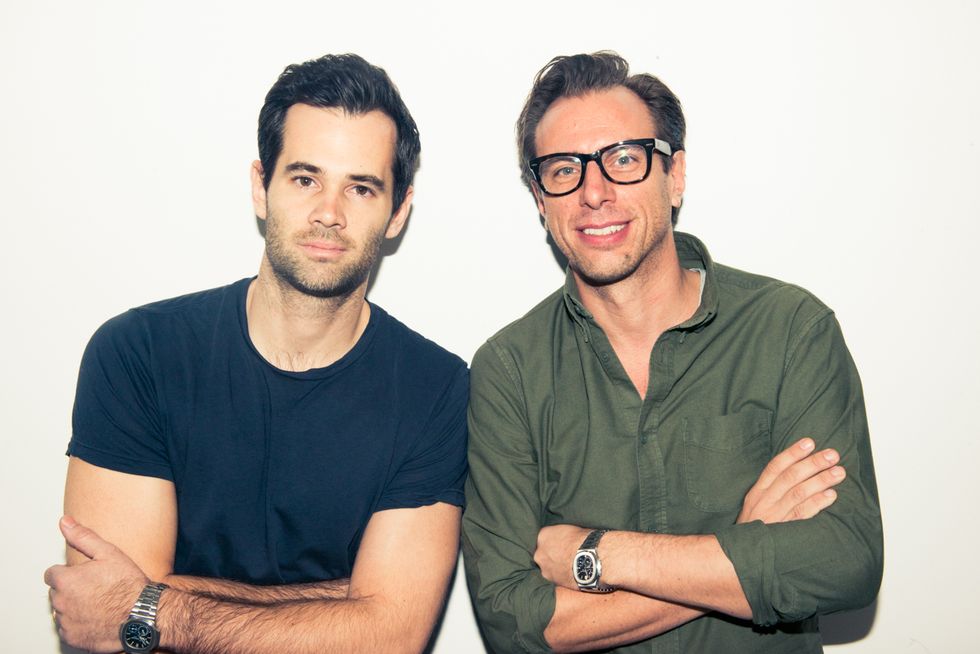
"To learn the craft. Having an opinion is not the same thing as ability. A lot of people come into this business thinking it is their taste and point of view that will make them. What we have learned is that it is the execution that will make you. There are millions of ideas out there, earning the right and skill to realize them is what is hard. We would encourage anyone who wants to be great, to first work for someone great and if not, bide their time practising and learning. We live in a society which wants quick gratification, but in reality, that is very unusual. We are still working towards our goals. We are still learning, trying to get better, earning our place and our clients and partners confidence in our execution."
"The most important thing for a fashion brand is to make great products, not how they communicate them. Great brands, with great products can afford to wait and call the play. Some have. Fashion is about selling a dream. A sense of discovery, belonging, beauty, desire and so on… not all brands should embrace all things for the purpose of doing them. How we tell stories and build the myth of a brand, is as much about what they don’t do and do not say. Having said that, all brands will live in a omnichannel world sooner or later, where e-commerce and bricks and mortar blend together, creating one great experience. The brands that are forging ahead, like Burberry, are of course reaping the awards of it. Wednesday has played a bigger part than most in shaping the digital experience in fashion from e-commerce to social for an extensive long list of brands and designers, including brands for all the major groups. We understand the benefits, but what is equally important is that what we do what is right for the brand. That’s the first conversation, what are we allowed to say and to whom are we talking."

